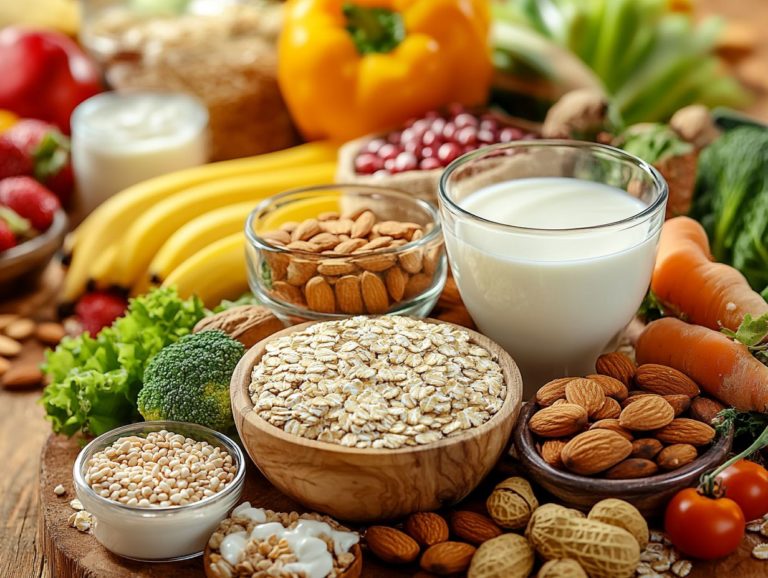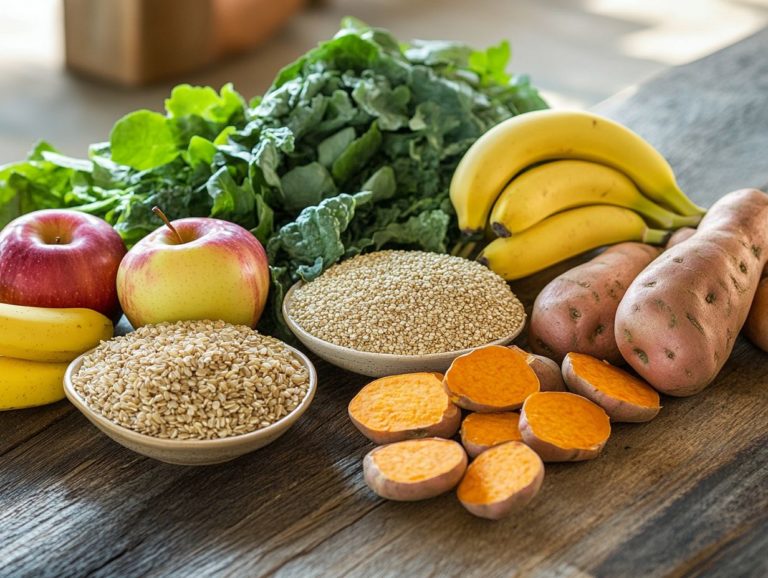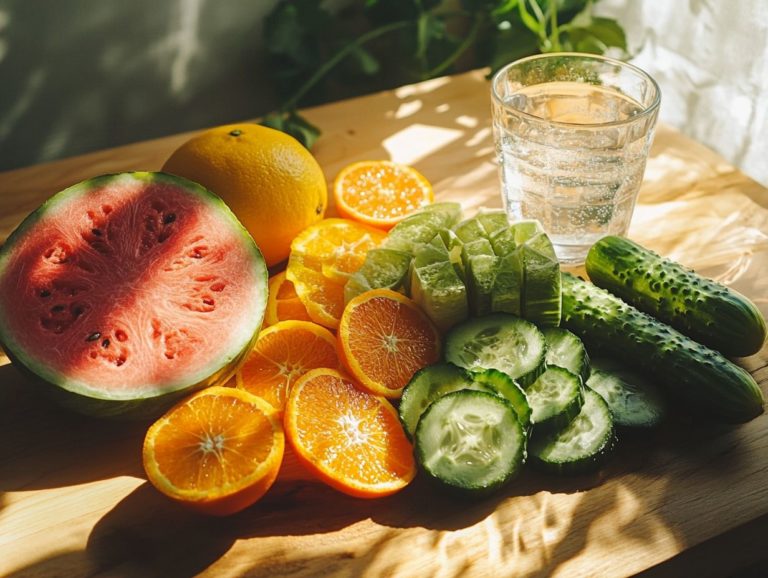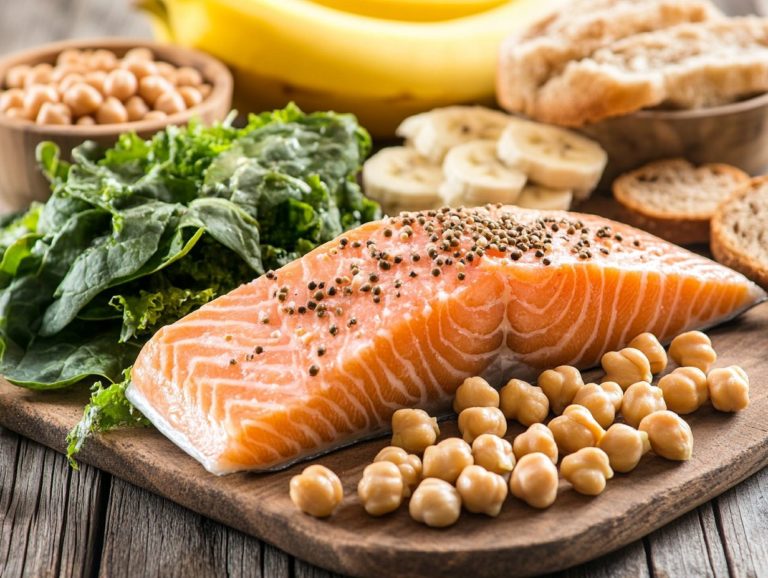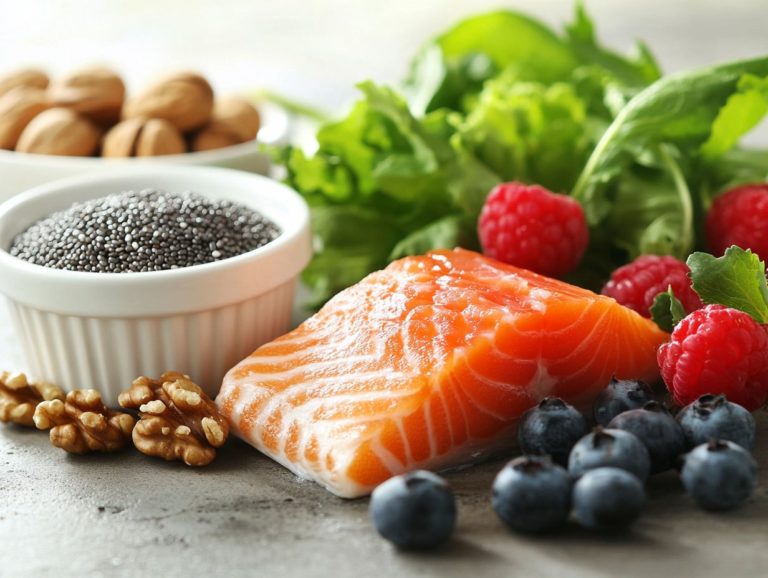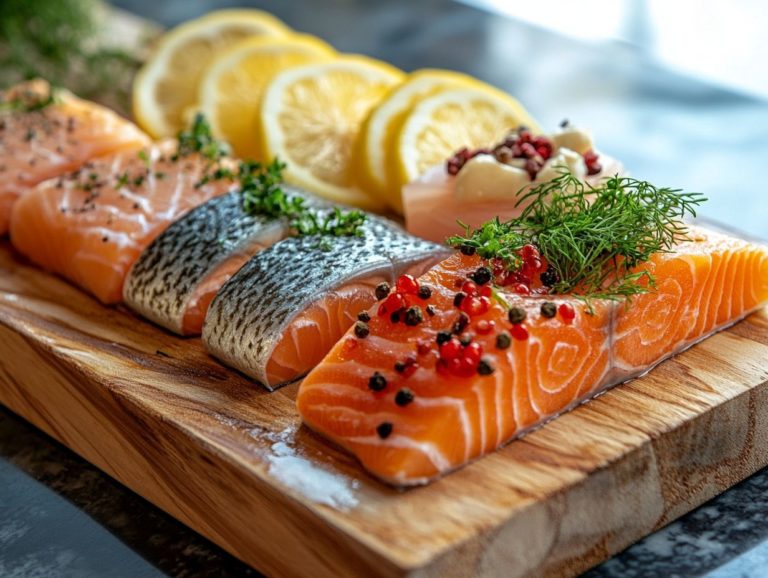5 Foods to Boost Your Nutrient Intake Today
Are you ready to elevate your diet with foods that are as nourishing as they are delightful? This article unveils five great sources of ingredients that not only tantalize your taste buds but also deliver a remarkable nutritional boost.
Imagine leafy greens overflowing with vitamin K and iron, alongside the healthy fats that are good for your heart and brain from salmon each ingredient offers a distinct advantage for enhancing your well-being.
Dive into their myriad benefits, gather insights on how to seamlessly incorporate them into your meals, and consider any potential allergies. You’ll also uncover scrumptious recipes designed to make healthy eating a breeze!
Contents
- Key Takeaways:
- 1. Leafy Greens for Vitamin K and Iron
- 2. Salmon for Omega-3 Fatty Acids
- 3. Eggs for Choline and Vitamin D
- 4. Avocado for Healthy Fats and Fiber
- 5. Nuts and Seeds for Essential Nutrients
- How Can These Foods Benefit Your Health?
- Frequently Asked Questions
- What are 5 foods that can boost my nutrient intake today?
- Why are leafy greens important for my nutrient intake?
- How can berries improve my nutrient intake?
- What nutrients can I get from nuts and seeds?
- What are the benefits of including fatty fish in my diet?
- How can whole grains contribute to my nutrient intake?
Key Takeaways:
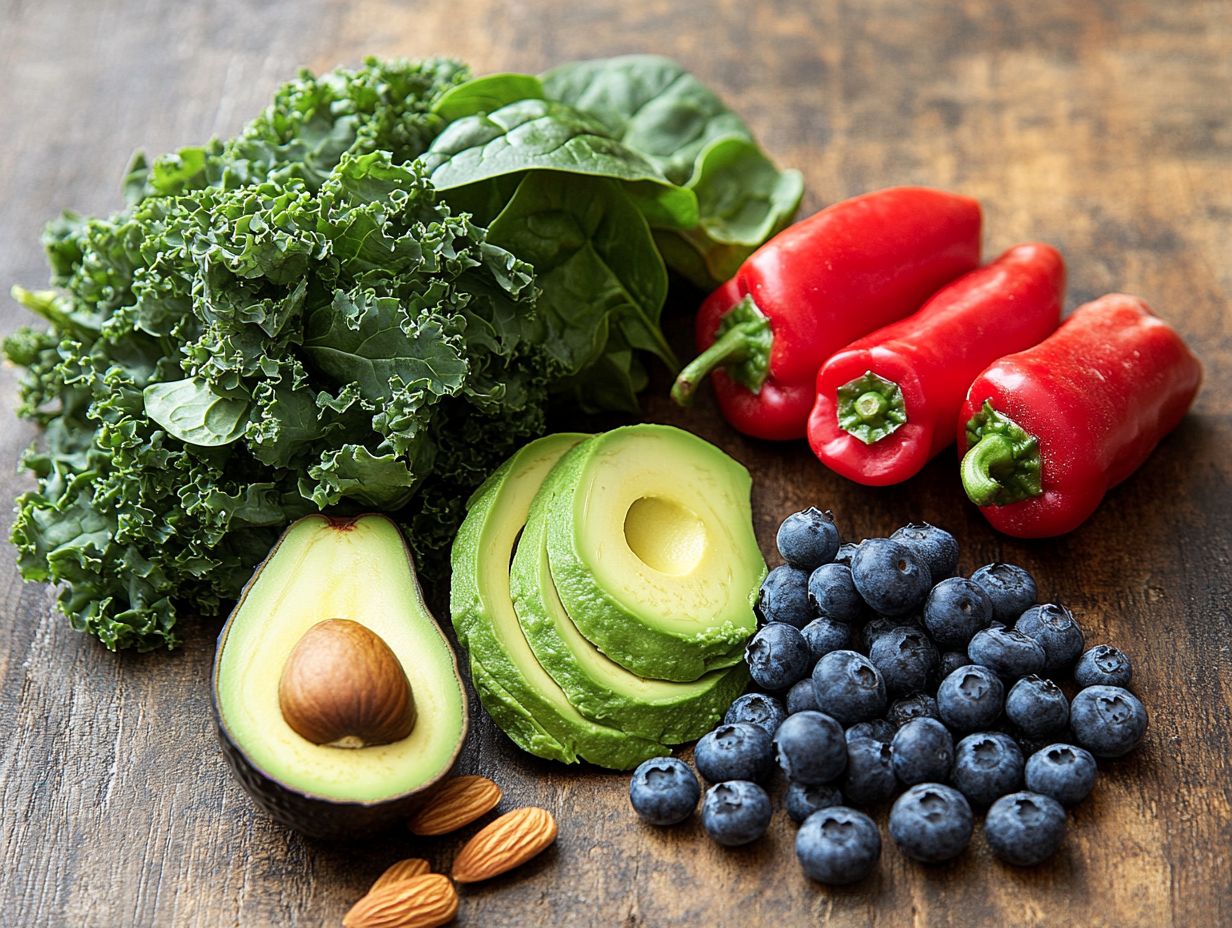
- Leafy greens are packed with vitamin K and iron, which are essential for maintaining healthy bones and preventing anemia.
- Salmon is a great source of omega-3 fatty acids, which can improve heart health and reduce inflammation in the body.
- Eggs provide choline and vitamin D, which are important for brain function and bone health.
- Avocado is rich in healthy fats and fiber, which can help lower cholesterol levels and improve digestion.
- Nuts and seeds are a nutrient-dense snack that provide essential vitamins and minerals, such as magnesium and vitamin E.
1. Leafy Greens for Vitamin K and Iron
Leafy greens like kale and broccoli are great sources of nutrients, brimming with essential vitamins and vital minerals. These nutrients are crucial for your overall health, helping to reduce inflammation and prevent cellular damage.
These vibrant vegetables not only boast impressive iron levels key for oxygen transport and energy production but they’re also packed with vitamin K, essential for blood clotting and bone health. Spinach, Swiss chard, and collard greens are also top contenders in this category, providing these nutrients in generous amounts.
By incorporating these greens into your diet, you can significantly support organ function and potentially lower the risk of chronic conditions like type 2 diabetes by increasing insulin sensitivity.
To truly maximize their nutritional benefits, consider lightly steaming or saut ing these greens. These cooking methods help preserve their vitamin content while transforming them into delicious, flavorful dishes that elevate your meals.
2. Salmon for Omega-3 Fatty Acids
Wild Atlantic salmon is a powerhouse of healthy fats that are good for your heart and brain. These beneficial fats can significantly reduce your heart risk and inflammation, making salmon a vital addition to a diverse, nutrient-rich diet.
These healthy fats play a crucial role in combating chronic inflammation in your body, which is linked to various conditions, including arthritis and heart disease. Omega-3s are not just good for your heart; they’re also essential for optimal brain function, supporting cognitive health and potentially enhancing your memory and mood.
Grilling or baking helps retain valuable nutrients without loading your meal with excessive fats. Even adding salmon to your salads or wraps can improve nutrient absorption, providing a delicious way to include this nutritious fish in your everyday meals.
3. Eggs for Choline and Vitamin D
Free-range eggs are a treasure trove of choline and vitamin D essential nutrients that are key players in supporting your brain health and immune function. They embody a versatile ingredient for healthful eating.
Choline is vital for boosting memory and cognitive functions, while vitamin D is crucial for promoting bone density and overall skeletal health. By weaving these nutrients into your daily diet, you’re not just enhancing your mental acuity; you’re also fortifying your physical well-being.
One delightful way to enjoy eggs is through a classic sunny-side-up preparation, with the yolk proudly serving as a nutritious centerpiece. If you re looking for variety, consider these options:
- Scrambling or hard-boiling eggs for a quick, protein-packed snack.
- Whipping up a fluffy omelet loaded with vegetables to amplify the health benefits even further.
These methods not only elevate flavor but also make it easy to incorporate eggs into your balanced meals.
Start adding these delicious and nutritious foods to your meals today for a healthier you!
4. Avocado for Healthy Fats and Fiber
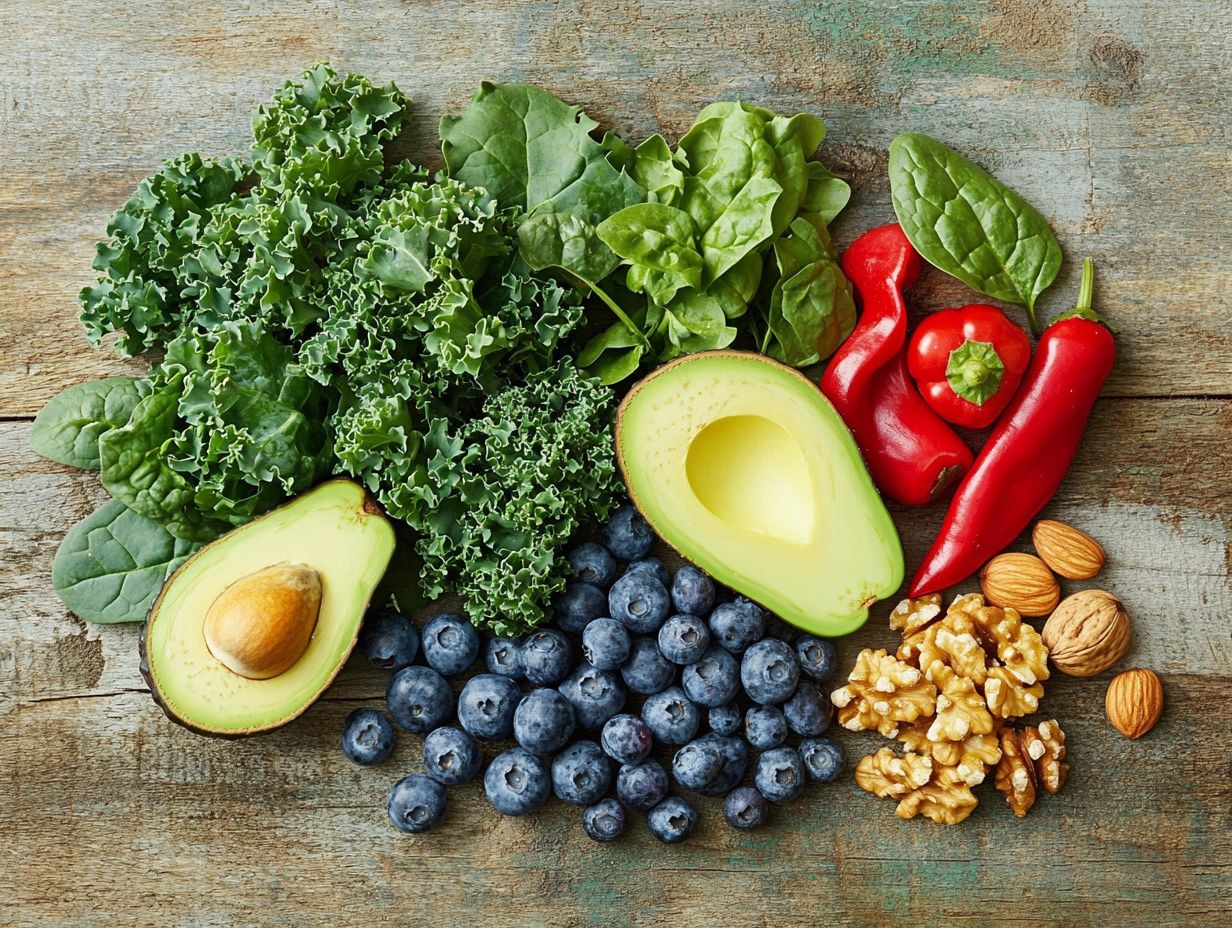
Avocados are a nutrient powerhouse, full of healthy fats and dietary fiber that enhance your digestive health. They also have antioxidant properties that help protect your cells from damage.
These healthy fats lower bad cholesterol and boost your heart health. The dietary fiber helps with weight management by making you feel full and curbing those pesky cravings.
Incorporating avocados into your meals is both effortless and delightful. For instance, you could:
- Blend avocados into smoothies for a luxurious, creamy texture.
- Use them as a spread on whole-grain toast, transforming a simple breakfast into something special.
- Toss them into salads for a vibrant nutrient boost.
This versatile fruit can elevate pasta dishes or serve as a base for creamy dressings, making it a wholesome addition to any meal you create.
5. Nuts and Seeds for Essential Nutrients
Nuts and seeds are treasure troves of essential nutrients, full of proteins, healthy fats, and antioxidants. They are a critical part of any health-focused, nutrient-dense diet.
Take almonds, for instance. They re not just tasty snacks; they’re rich in vitamin E and magnesium, offering potent antioxidant properties that can enhance your skin health and support optimal heart function.
Chia seeds are an excellent source of healthy fats that are good for your heart and brain, crucial for reducing inflammation and maintaining brain health.
Then there are pumpkin seeds, which are full of zinc and iron. These nutrients can enhance your immunity and boost energy levels. These nutrient-dense options deliver complex carbohydrates and natural substances that benefit your health.
Incorporating a variety of these foods into your daily meals is essential for unlocking their full spectrum of health benefits.
How Can These Foods Benefit Your Health?
Incorporating nutrient-dense foods like leafy greens, salmon, eggs, avocados, and nuts into your diet can significantly elevate your overall health. These choices reduce inflammation, enhance nutrient absorption, and provide essential vitamins and minerals.
These foods are true powerhouses of nutrition. For example, salmon’s omega-3 fatty acids support both heart health and brain function, while leafy greens combat oxidative stress.
Eggs deliver high-quality protein and essential nutrients like choline, which is crucial for cognitive development. Nuts are rich in vitamins, minerals, and fiber that aid in weight management and support gut health.
Embracing a diverse array of these nutrient-dense foods fosters your daily wellness and plays a pivotal role in preventing chronic diseases. Consider adding superfoods rich in nutrients to create a solid foundation for your long-term health.
What Other Nutrients Do These Foods Provide?
Beyond their primary nutrients, these foods offer a remarkable array of vitamins and minerals, including 5 foods to get your daily zinc intake, that amplify their health benefits. They support a balanced diet that champions your overall well-being.
Take leafy greens, for example. Spinach and kale are full of vitamins A, C, and K, which play crucial roles in maintaining healthy vision, boosting immune function, and fortifying bone health.
Nuts and seeds deliver magnesium, vital for muscle function and energy production, along with vitamin E, an antioxidant that protects your cells from damage.
Citrus fruits are rich in vitamin C, enhancing skin health and collagen production while providing B vitamins that support energy metabolism.
By incorporating such a diverse assortment of foods into your meals, you enrich your diet while ensuring a spectrum of nutrients that harmoniously work together to enhance your overall health.
Make these tasty foods a part of your daily meals for a healthier you!
How Can You Incorporate These Foods into Your Diet?
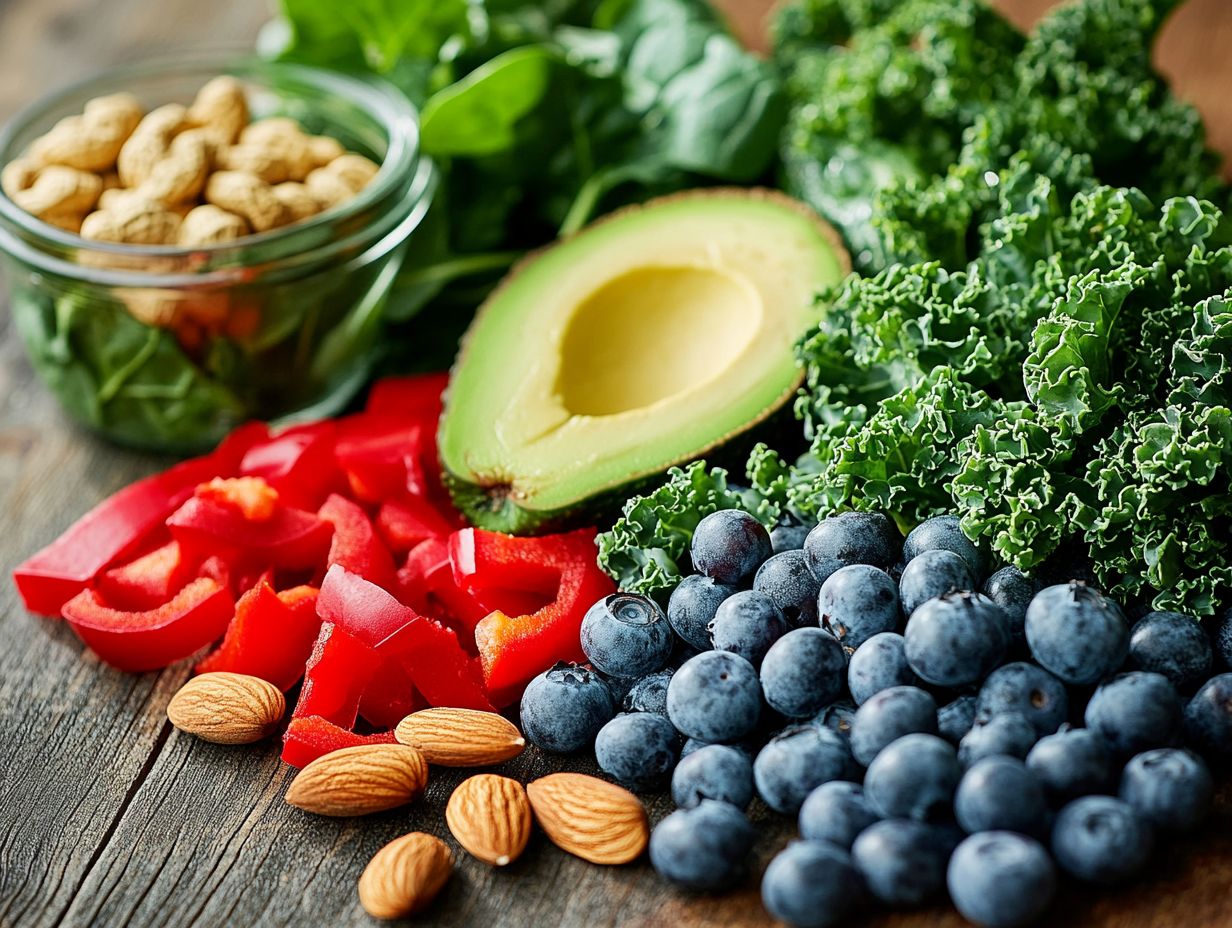
Incorporar opciones ricas en nutrientes en tus comidas diarias puede ser tanto simple como delicioso, especialmente cuando aprovechas ingredientes frescos y m todos de cocci n innovadores que realmente maximizan su valor nutricional.
Explora diversas t cnicas como al vapor, asar y saltear para preservar las vitaminas y minerales esenciales mientras elevas los sabores de los alimentos elegidos.
Por ejemplo, asar verduras de temporada como br coli y zanahorias con un chorrito de aceite de oliva y un poco de hierbas puede crear un delicioso acompa amiento.
No dudes en experimentar con granos enteros como la quinoa o el farro; proporcionan una base sustanciosa para tazones nutritivos cubiertos con prote nas como pollo a la parrilla o garbanzos.
Y recuerda, agregar verduras de hoja a tus batidos o ensaladas es una excelente manera de aumentar tanto la nutrici n como el sabor.
Are There Any Potential Risks or Allergies Associated with These Foods?
While the health benefits of nutrient-rich foods are undeniably significant, it s crucial for you to remain vigilant about potential allergies and risks associated with certain ingredients, particularly nuts and seafood.
Many individuals face allergic reactions to these food groups, which can range from mild discomfort to life-threatening situations. If you re among those who are prone to such allergies, approach these foods with caution.
Check food labels, ask insightful questions at restaurants, and be mindful of cross-contamination to ensure your safety.
For those with sensitivities, alternatives like seeds instead of nuts or plant-based seafood substitutes can offer similar taste and texture without the risks. This thoughtful consideration allows you to enjoy your meals while placing your health and well-being at the forefront.
What Are Some Delicious Recipes That Include These Nutrient-Rich Foods?
Creating delicious meals with nutrient-rich foods is not just easy; it s an enjoyable journey that brings a wealth of recipes to your table.
These recipes showcase the health benefits of each ingredient while promoting healthful eating.
With a variety of cooking methods at your disposal from steaming to roasting these recipes enhance the natural flavors while preserving essential nutrients.
Whether you re experimenting with vibrant greens in a stir-fry or incorporating hearty whole grains into a comforting soup, each dish offers a delightful twist on traditional meals.
By introducing bold spices and fresh herbs, you can effortlessly transform everyday ingredients into culinary masterpieces.
Emphasizing wholesome choices not only nourishes your body but also ignites creativity in the kitchen, turning every cooking experience into an opportunity to explore new tastes and textures.
Frequently Asked Questions
What are 5 foods that can boost my nutrient intake today?
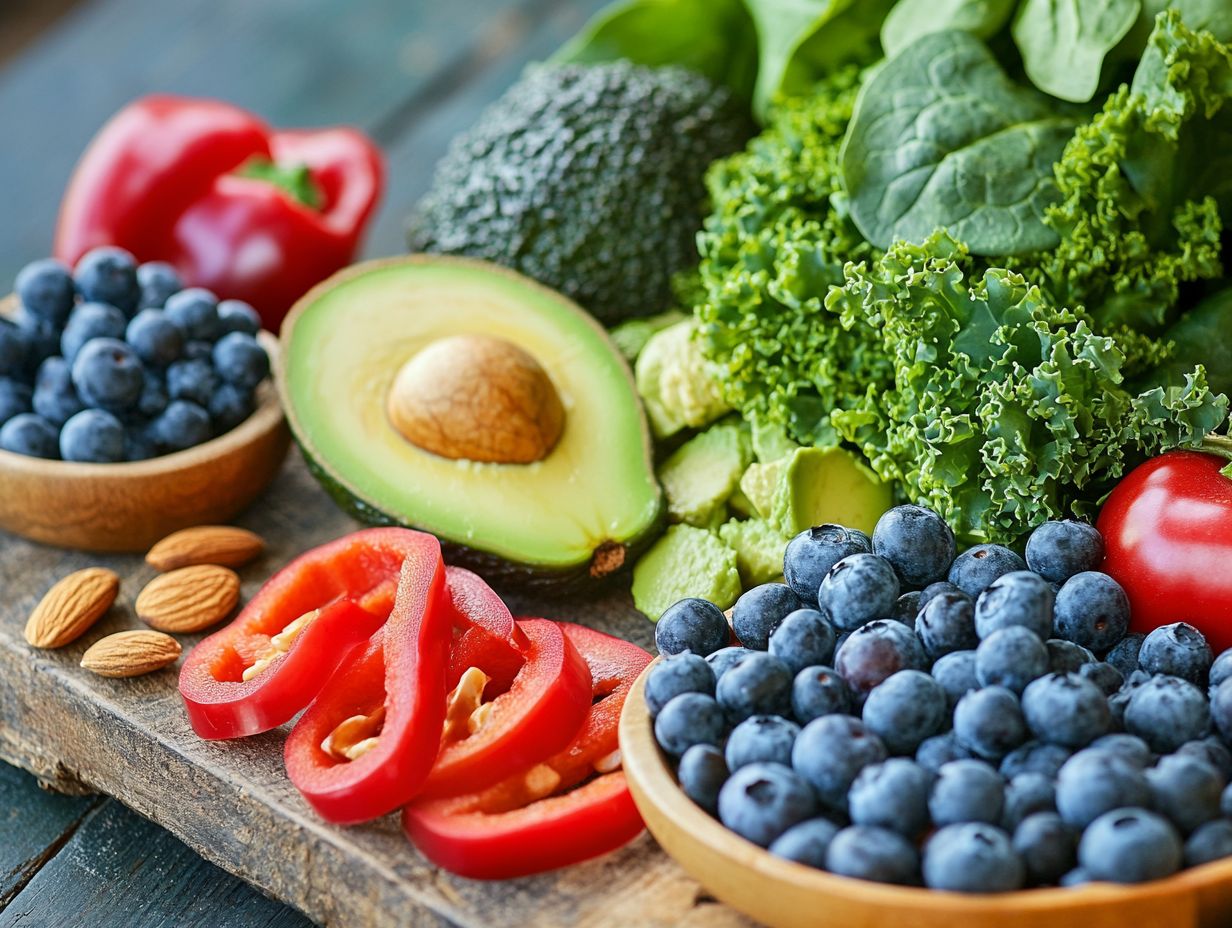
The 5 foods to increase your nutrient absorption today are leafy greens, berries, nuts and seeds, fatty fish, and whole grains.
Why are leafy greens important for my nutrient intake?
Leafy greens are packed with vitamins, minerals, and antioxidants that can help improve your immune system, heart health, and digestion.
How can berries improve my nutrient intake?
Berries are rich in vitamins, minerals, and antioxidants that can help improve brain function, heart health, and skin health.
What nutrients can I get from nuts and seeds?
Nuts and seeds are excellent sources of healthy fats, protein, fiber, and essential vitamins and minerals like iron, magnesium, and vitamin E.
What are the benefits of including fatty fish in my diet?
Fatty fish like salmon, sardines, and tuna are great sources of omega-3 fatty acids, which can help improve heart health, brain function, and reduce inflammation in the body.
How can whole grains contribute to my nutrient intake?
Whole grains, such as quinoa, brown rice, and whole wheat bread, are good sources of fiber, vitamins, and minerals that can help improve digestion, heart health, and regulate blood sugar levels.
Start incorporating these delicious foods today for a healthier you!

